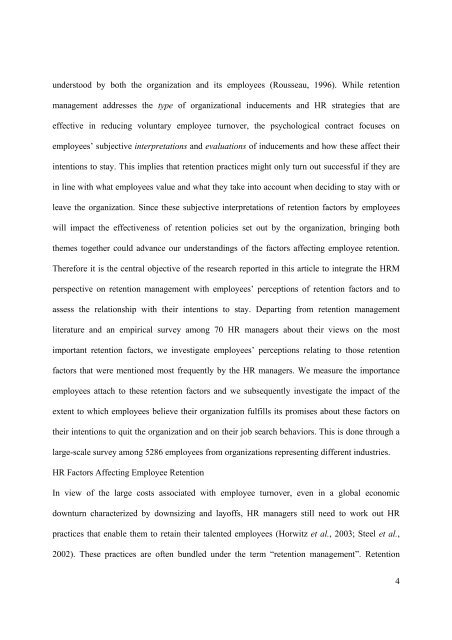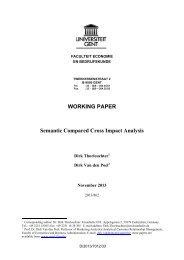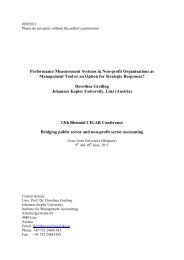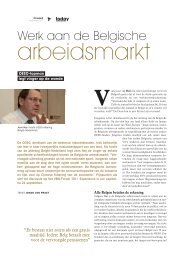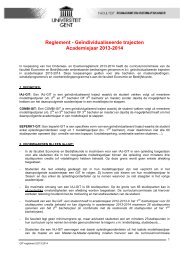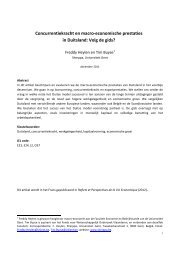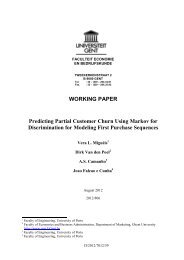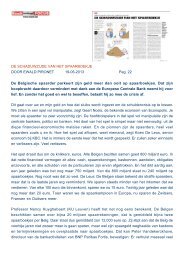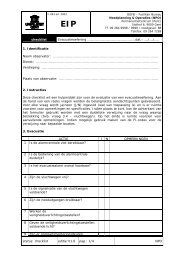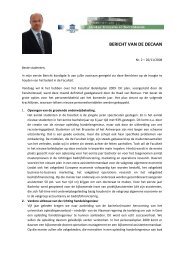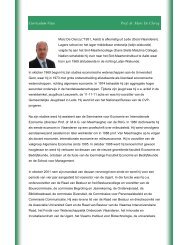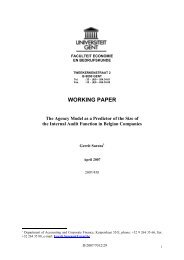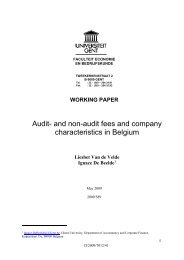WORKING PAPER - Faculteit Economie en Bedrijfskunde
WORKING PAPER - Faculteit Economie en Bedrijfskunde
WORKING PAPER - Faculteit Economie en Bedrijfskunde
Create successful ePaper yourself
Turn your PDF publications into a flip-book with our unique Google optimized e-Paper software.
understood by both the organization and its employees (Rousseau, 1996). While ret<strong>en</strong>tion<br />
managem<strong>en</strong>t addresses the type of organizational inducem<strong>en</strong>ts and HR strategies that are<br />
effective in reducing voluntary employee turnover, the psychological contract focuses on<br />
employees’ subjective interpretations and evaluations of inducem<strong>en</strong>ts and how these affect their<br />
int<strong>en</strong>tions to stay. This implies that ret<strong>en</strong>tion practices might only turn out successful if they are<br />
in line with what employees value and what they take into account wh<strong>en</strong> deciding to stay with or<br />
leave the organization. Since these subjective interpretations of ret<strong>en</strong>tion factors by employees<br />
will impact the effectiv<strong>en</strong>ess of ret<strong>en</strong>tion policies set out by the organization, bringing both<br />
themes together could advance our understandings of the factors affecting employee ret<strong>en</strong>tion.<br />
Therefore it is the c<strong>en</strong>tral objective of the research reported in this article to integrate the HRM<br />
perspective on ret<strong>en</strong>tion managem<strong>en</strong>t with employees’ perceptions of ret<strong>en</strong>tion factors and to<br />
assess the relationship with their int<strong>en</strong>tions to stay. Departing from ret<strong>en</strong>tion managem<strong>en</strong>t<br />
literature and an empirical survey among 70 HR managers about their views on the most<br />
important ret<strong>en</strong>tion factors, we investigate employees’ perceptions relating to those ret<strong>en</strong>tion<br />
factors that were m<strong>en</strong>tioned most frequ<strong>en</strong>tly by the HR managers. We measure the importance<br />
employees attach to these ret<strong>en</strong>tion factors and we subsequ<strong>en</strong>tly investigate the impact of the<br />
ext<strong>en</strong>t to which employees believe their organization fulfills its promises about these factors on<br />
their int<strong>en</strong>tions to quit the organization and on their job search behaviors. This is done through a<br />
large-scale survey among 5286 employees from organizations repres<strong>en</strong>ting differ<strong>en</strong>t industries.<br />
HR Factors Affecting Employee Ret<strong>en</strong>tion<br />
In view of the large costs associated with employee turnover, ev<strong>en</strong> in a global economic<br />
downturn characterized by downsizing and layoffs, HR managers still need to work out HR<br />
practices that <strong>en</strong>able them to retain their tal<strong>en</strong>ted employees (Horwitz et al., 2003; Steel et al.,<br />
2002). These practices are oft<strong>en</strong> bundled under the term “ret<strong>en</strong>tion managem<strong>en</strong>t”. Ret<strong>en</strong>tion<br />
4


